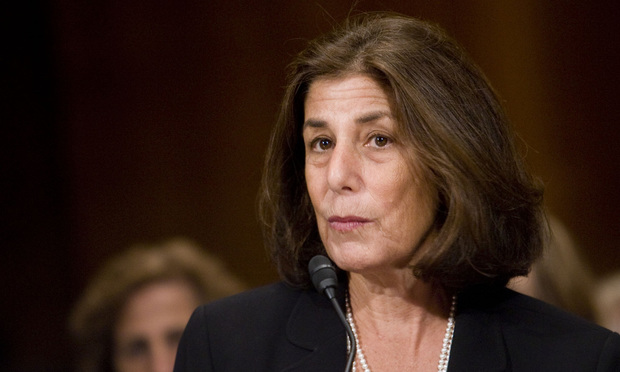Federal Judge to Hear Arguments Over Nov. 6 Paper Ballot Proposal
U.S. District Judge Amy Totenberg will hear from academics, cybersecurity experts and public officials during an all-day hearing over whether the state should use paper ballots during the midterm elections.
September 11, 2018 at 04:56 PM
5 minute read
 Judge Amy Totenberg, U.S. District Court for the Northern District of Georgia (Photo: Diego M. Radzinschi/ALM)
Judge Amy Totenberg, U.S. District Court for the Northern District of Georgia (Photo: Diego M. Radzinschi/ALM)
Armed with a new report warning officials across the nation to forego electronic voting in the November midterm elections, Georgia voters are urging a federal judge in Atlanta to order the state to institute paper ballots.
Judge Amy Totenberg of the U.S. District Court for the Northern District of Georgia is slated to hold an all-day hearing Wednesday before deciding whether to order a preliminary injunction mandating the conversion to paper ballots before Nov. 6.
Last week, attorneys representing plaintiff voters and a national Colorado-based coalition urging a return to paper ballots proposed an order that would prohibit Georgia Secretary of State and Republican gubernatorial candidate Brian Kemp, the State Board of Elections and 159 county election boards from using Georgia's antiquated electronic voting machines for the upcoming election.
The proposed order, if Totenberg signs it, also would direct Kemp to tell county election officials to use paper ballots in the fall and would require the secretary of state and the board to implement rules and procedures for manual audits of the election results before they are certified.
A preliminary witness list suggests the seven-hour hearing will include competing testimony by a roster of academic and cybersecurity experts and public officials. Kemp's counsel contends that converting to paper ballots is not feasible before November and would likely throw the midterm election into chaos.
Counsel for the plaintiff voters and the Coalition for Good Governance include a team of attorneys from Morrison & Foerster in Washington, D.C., led by partner David Cross; Bruce Brown, who represented the state of Georgia for nearly 15 years in the ongoing water wars litigation; Cary Ichter of Ichter Davis; and Seattle attorney Robert McGuire.
Former Democratic Gov. Roy Barnes and law partner John Salter Jr. are defending Kemp and the state elections board.
They have enlisted former Secretary of State Cathy Cox, now dean of Mercer University's School of Law, as a witness to testify about the “infeasibility” of returning to widespread paper ballot voting before early voting begins next month.
Following the chaos of the 2000 presidential ballot count in Florida, Cox ordered an overhaul of Georgia's voting systems and introduced the Diebold Election Systems electronic touchscreen voting machines that are still in use today.
Totenberg has called the proposed paper ballot injunction “a pressing challenge,” but “no small request.” Prior to the hearing, the judge sought more information about the possible effects of an injunction and whether it would “adversely impact the public interest” by compromising the election's integrity and the ability of the state to successfully carry it off.
In the federal lawsuit filed last year, the plaintiff voters and the coalition warned that the state's voting infrastructure has already been compromised and that, absent a return to paper ballots, the legitimacy of the November election results will be cast into doubt.
Citing alarms raised by national security officials this summer, they contend Georgia's election infrastructure was targeted by hackers working for Russian intelligence operatives. According to an affidavit filed with the injunction motion, at least three cybersecurity experts discovered Kennesaw State University's Center for Election Systems failed to secure from public access confidential data for more than five million voters, election software applications, encryption keys, passwords for voting equipment and administration, ballot proofs, tabulation and memory card programming databases for past and future elections, and other sensitive information intended for exclusive use by county election officials across the state.
KSU's contract with the secretary of state to house the data and make it available to county election officials was terminated last year. Kemp's spokeswoman has repeatedly said the state elections infrastructure and voting equipment “remain secure” and that no evidence has surfaced that data was manipulated in any way.
In addition to Cox, those expected to testify include:
- Richard DeMillo, a computer science professor at Georgia Tech. DeMillo submitted an affidavit last week highlighting “Securing the Vote,” a new report released Sept. 5 by the National Academies of Science, Engineering and Medicine spelling out the harm that malicious cyber actors can wreak on the nation's vulnerable election infrastructure. The report warned that, “Every effort should be made to use human-readable paper ballots in the 2018 federal election”—an assessment DeMillo concurs with.
- Michael Barnes, who headed the KSU elections center until last year. Barnes works for the state elections division.
- Alex Halderman, a computer science an engineering professor at the University of Michigan. In April, Halderman and The New York Times staged a mock election to demonstrate how the touchscreen voting machines in use in Georgia could be hacked to overturn an election.
- Chris Harvey, Kemp's state elections director. Harvey said in a declaration filed last month that switching to paper ballots “would require investments in equipment and supplies that are not currently available” and require new security protocols. He also predicted “a substantial risk of voter confusion, disruption, increased errors at polls, increased wait times, suppressed voter turnout, and potential disenfranchisement.”
- Rebecca Sullivan, general counsel at Georgia's Department of Administrative Services, which handles state purchasing contracts.
This content has been archived. It is available through our partners, LexisNexis® and Bloomberg Law.
To view this content, please continue to their sites.
Not a Lexis Subscriber?
Subscribe Now
Not a Bloomberg Law Subscriber?
Subscribe Now
NOT FOR REPRINT
© 2025 ALM Global, LLC, All Rights Reserved. Request academic re-use from www.copyright.com. All other uses, submit a request to [email protected]. For more information visit Asset & Logo Licensing.
You Might Like
View All

On The Move: Ex-Partner Returns to Lead Nelson Mullins Corporate Group, Burr & Forman Hires University GC as COO
5 minute read
Law Firm Sued for Telemarketing Calls to Customers on Do Not Call Registry

Evidence Explained: Prevailing Attorney Outlines Successful Defense in Inmate Death Case
Trending Stories
Who Got The Work
J. Brugh Lower of Gibbons has entered an appearance for industrial equipment supplier Devco Corporation in a pending trademark infringement lawsuit. The suit, accusing the defendant of selling knock-off Graco products, was filed Dec. 18 in New Jersey District Court by Rivkin Radler on behalf of Graco Inc. and Graco Minnesota. The case, assigned to U.S. District Judge Zahid N. Quraishi, is 3:24-cv-11294, Graco Inc. et al v. Devco Corporation.
Who Got The Work
Rebecca Maller-Stein and Kent A. Yalowitz of Arnold & Porter Kaye Scholer have entered their appearances for Hanaco Venture Capital and its executives, Lior Prosor and David Frankel, in a pending securities lawsuit. The action, filed on Dec. 24 in New York Southern District Court by Zell, Aron & Co. on behalf of Goldeneye Advisors, accuses the defendants of negligently and fraudulently managing the plaintiff's $1 million investment. The case, assigned to U.S. District Judge Vernon S. Broderick, is 1:24-cv-09918, Goldeneye Advisors, LLC v. Hanaco Venture Capital, Ltd. et al.
Who Got The Work
Attorneys from A&O Shearman has stepped in as defense counsel for Toronto-Dominion Bank and other defendants in a pending securities class action. The suit, filed Dec. 11 in New York Southern District Court by Bleichmar Fonti & Auld, accuses the defendants of concealing the bank's 'pervasive' deficiencies in regards to its compliance with the Bank Secrecy Act and the quality of its anti-money laundering controls. The case, assigned to U.S. District Judge Arun Subramanian, is 1:24-cv-09445, Gonzalez v. The Toronto-Dominion Bank et al.
Who Got The Work
Crown Castle International, a Pennsylvania company providing shared communications infrastructure, has turned to Luke D. Wolf of Gordon Rees Scully Mansukhani to fend off a pending breach-of-contract lawsuit. The court action, filed Nov. 25 in Michigan Eastern District Court by Hooper Hathaway PC on behalf of The Town Residences LLC, accuses Crown Castle of failing to transfer approximately $30,000 in utility payments from T-Mobile in breach of a roof-top lease and assignment agreement. The case, assigned to U.S. District Judge Susan K. Declercq, is 2:24-cv-13131, The Town Residences LLC v. T-Mobile US, Inc. et al.
Who Got The Work
Wilfred P. Coronato and Daniel M. Schwartz of McCarter & English have stepped in as defense counsel to Electrolux Home Products Inc. in a pending product liability lawsuit. The court action, filed Nov. 26 in New York Eastern District Court by Poulos Lopiccolo PC and Nagel Rice LLP on behalf of David Stern, alleges that the defendant's refrigerators’ drawers and shelving repeatedly break and fall apart within months after purchase. The case, assigned to U.S. District Judge Joan M. Azrack, is 2:24-cv-08204, Stern v. Electrolux Home Products, Inc.
Featured Firms
Law Offices of Gary Martin Hays & Associates, P.C.
(470) 294-1674
Law Offices of Mark E. Salomone
(857) 444-6468
Smith & Hassler
(713) 739-1250






